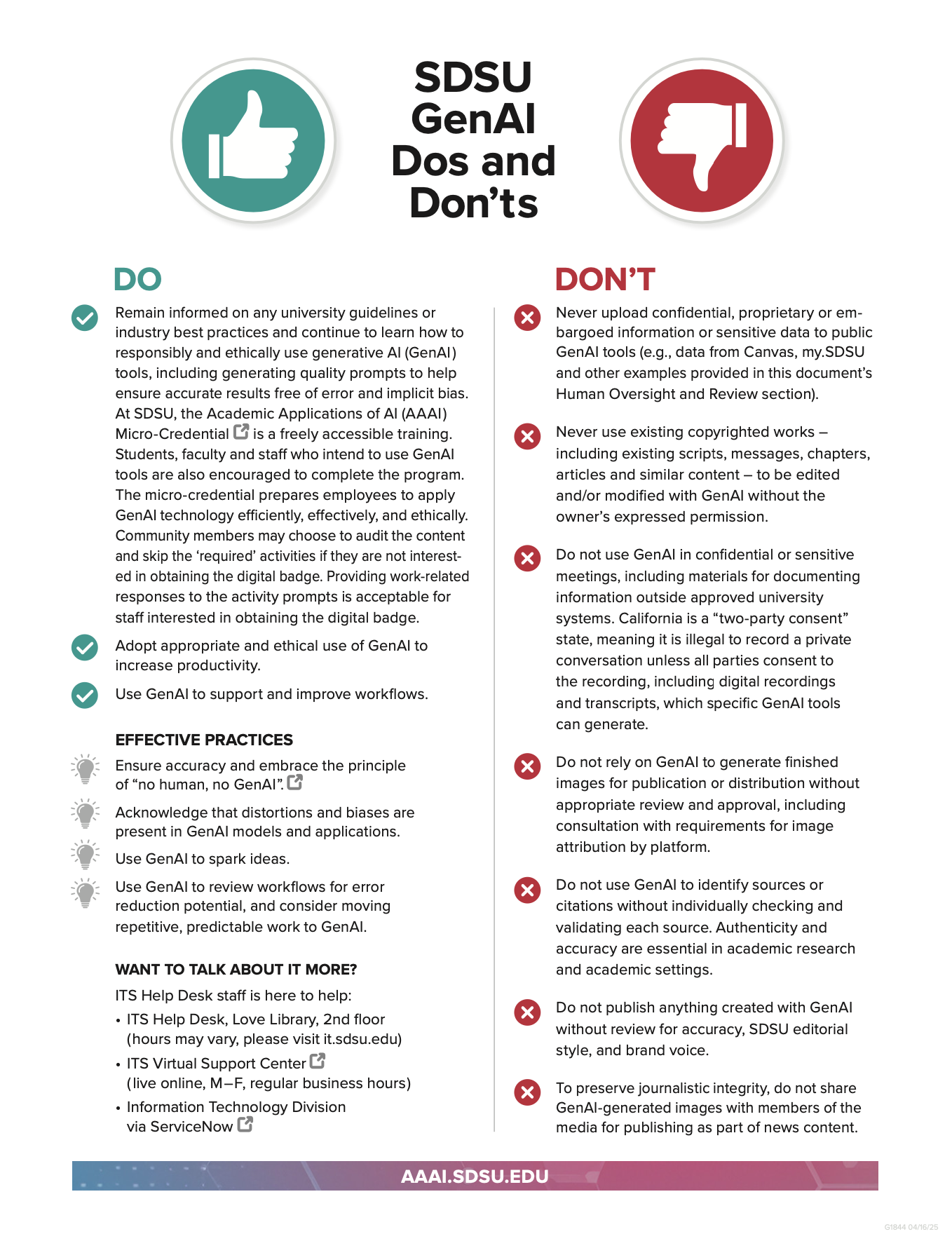GenAI Guidelines
San Diego State University has a principled and agile generative artificial intelligence (GenAI) strategy that supports responsible and ethical adoption among university employees. In adopting GenAI tools, SDSU employees should follow important considerations related to information security, data and personal privacy, compliance, copyright and protection of proprietary information, and accuracy and academic integrity.
SDSU does not guide employees’ personal use of GenAI. While these guidelines are specific to professional work conducted at SDSU, they may also apply to adopting GenAI for personal use.
The following guidelines are developed to guide university employees who choose to adopt GenAI tools as part of their job duties. Independent unit-level guidelines should not be produced in tandem with or to replace these approved guidelines.
Get professional GenAI training
Artificial Intelligence (AI) and Generative AI (GenAI) are transforming the way we learn, work and innovate. As a university dedicated to excellence in education, research and service, we recognize the immense potential these technologies hold for enhancing academic discovery, improving efficiency and fostering new opportunities across disciplines.
Given the rapidly changing landscape of GenAI, SDSU students, faculty and staff should stay informed about advancements in GenAI technologies and best practices for their ethical and responsible use, including regular training and knowledge-sharing. SDSU students, faculty and staff are encouraged to complete the Academic Applications of AI (AAAI) Micro-Credential and seek additional skills development from the CSU’s AI training library.
Rely on professional tools, keep privacy in mind
Care should be taken to use only professional versions of GenAI tools.
Never upload confidential, proprietary or embargoed information or data to public GenAI tools. Examples of protected information include personally identifiable information, such as a person’s name and details related to their educational or professional records, personal identification numbers, and medical or counseling records. Confidential university information and information related to academic research and integrity—to include research-related information held under embargo—also should not be added to GenAI tools as prompts.
Never use existing copyrighted works – including existing scripts, messages, chapters, articles and similar content – to be edited and/or modified by GenAI tools without the express permission of the owner of said content.
Seek Support as Needed
 Open the image full screen.
Open the image full screen.No matter your level of comfort or expertise, SDSU faculty and staff are encouraged to complete the Academic Applications of AI (AAAI) Micro-Credential.
If you have questions about Microsoft Copilot, SDSU’s preferred GenAI tool, contact the Information Technology Division via ServiceNow or (live online M-F during regular business hours) at the ITS Virtual Support Center. Marketing and communications professionals can contact StratComm at [email protected] with questions.
GenAI should augment work
GenAI-generated content may not be used without being reviewed and fact-checked by a human editor. GenAI tools should refine original work and not be autonomous. GenAI tools may be used in many ways, to include the following:
- Pre-writing or pre-production: GenAI tools may be used to brainstorm ideas and concepts, research topics, collect samples or examples, develop outlines, identify themes, or organize calendars and plans.
- Drafting content, aiding in efficiency or productivity: Some GenAI tools support content generation based on prompts, including initial and draft versions of scripts, letters, translations into multiple languages, descriptions, summaries, outlines, interpretations of data, transcripts, social posts and visuals/visualizations. social posts.
- Editing: GenAI tools can edit and revise content based on style and tone and serve as a thesaurus to work or rework content sections.
- Revising: After original content is generated, many GenAI tools help identify and alter style/tone, spelling, punctuation, and grammar. They can also check for inclusive language and implicit bias but should not supersede SDSU’s editorial guidelines or brand guidelines.
- Content testing: GenAI tools can help anticipate potential questions or concerns.
- Search engine optimization (SEO): GenAI tools may assist with keyword research to improve content readability, keyword usage and word relevancy, thus improving web page quality and performance.
- Improve code quality: Some GenAI tools can improve computer code's overall quality and consistency, aiding debugging.
Ensure accurate, bias-free content
SDSU students, faculty and staff are encouraged to adopt GenAI tools appropriately and ethically.
AI-generated material must be carefully reviewed, fact-checked, edited, approved and managed by a human author. All work is to remain human-led.
Ensuring accuracy and accurate representation is a core priority. GenAI technology is never to be used to deceive, spread misinformation, privilege any specific group or make claims that have not been substantiated by human sources.
Be attentive to restrictions, state laws
Do not use GenAI in confidential or sensitive meetings, including materials for documenting information outside approved university systems. California is a “two-party consent” state, meaning it is illegal to record a private conversation unless all parties consent to the recording, including digital recordings and transcripts, which certain GenAI tools can generate.
Specific guidance for communications professionals
For communications and marketing professionals, GenAI tools are not to be used to produce bylined or complete website content as original material for SDSU. Such tools will not be used to create entire pieces of content. Please review additional guidance and support on written and visual content in the AI Brand Library.
Specific guidance for faculty
We encourage faculty to discuss the use of AI tools with their students and to outline expectations for those tools on course assessments and deliverables. The SDSU University Senate IT Committee’s guidelines can be found beginning on page 124 of the Curriculum Guide.
